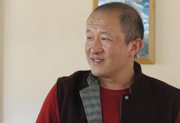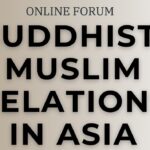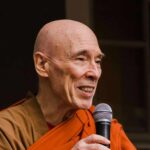
Q&A 31 January, 2011 – Understanding and redefining culture, particularly in the context of a society?s changing priorities and values, the importance of a national language of communication and promoting job dignity are some of the many issues confronting Bhutan today.
Dzongsar Khyentse Rinpoche, in a perspective titled ?Many Questions, Few Answers?, which featured in Kuensel last year, wrote about these issues and posed some tough but thought provoking questions.
Kuensel?s Kesang Dema spoke with Khyentse Rinpoche to find answers to some of the questions raised.
To start with, what made you write the piece?
Actually what I?ve written, the thoughts and concerns, had been there for a long time. There had always been a hesitation. You know we Bhutanese have a lot of etiquettes and we worry how somebody might get upset.
I took a bold decision. I thought it?s better to say now than not say all these, go through the consequences and regret for having not said this.
I was genuinely interested. My article?s title suggested there are many questions but no answers and sadly I still haven?t got a proper answer. Probably it is also not easy to answer these questions.
You wrote about redefining outmoded culture and values, which are an integral part of the Bhutanese society. What does it mean to change something that?s been rooted for centuries?
We don?t really need to change a lot of our culture and habits. But there are probably a few we can do without.
I can?t pinpoint which culture while I have mentioned in my article that for one we could reconsider our national obsession with the colour of our robes. Sometimes I really wonder how necessary or useful it is. Rather, it could be more divisive and create more class-consciousness, a lot of dignity and others. So I thought this could solve a bit of problem.
Dignity of labour or the lack of it is a major problem in Bhutan. What can we do about it?
I?ll have to say a big responsibility lies on people like me, elites and big people, and I mean those people who have privileges. It has to come from us. If we don?t show example, and if we don?t walk the talk, it?ll be just an empty mouthing.
It?s not like we don?t have it inherently, you know because I have seen many Bhutanese in New York, some carrying out prestigious work here doing meager work there. They appear so happy and confident.
That?s one thing we could do. Also I think schools, educators and social activists could also educate people so that we?ll find job dignity in whatever we do. But I think it takes a lot to have our acts together.
Your argument on the need to rethink Dzongkha as the main language invited personal diatribes. Why do you think so?
One of the respondents to my article had written a really beautiful piece in English. It was so impressive. Almost 10 to 20 words, I had to look at the dictionary to find what it means. But I would be happier if you write it just like that in Dzongkha. That?s what I mean.
Language is very important, as we all know. One of the reasons why there is no job dignity and all these is also because of the literacy. Communication is the most important. Things fall apart when there is no communication. So the only means, one of the fastest ways to communicate, is through the language.
We have to create a language that is pervasive, easy, accessible and I am not saying Dzongkha is not the right one. I am just questioning and right now, I haven?t got the right answer. And while we are developing Dzongkha, probably we are missing out a lot because things are moving so fast.
What, according to you, are the core values and principles in our ancient traditions that are timeless and genuinely contribute to our wellbeing?
When a Bhutanese find a cockroach, before they kill it, they have a second thought on whether they should do it or not. That is what makes Bhutanese so special. They might kill it anyway. But that concern, the awkward feeling of may be I shouldn?t do it. That is something they shouldn?t lose.
Everything is about GNH today. What does it mean to you?
Ultimately, as I was mentioning, GNH is really one of the most fundamental concept of Buddhist teaching. This is how I interpret. No aggression, no passion, no ignorance. But GNH, relatively and practically, is a philosophy or a path of wiser greed, a more enlightened greed and to follow that and develop that.
Right now, our greed is just completely stupid. So stupid that it?s actually destroying ourselves. Why would you do that? Why not have a wiser greed so that you can have more fun, so that you can live happy, so that you can make others happy, by which it also makes you happy.











